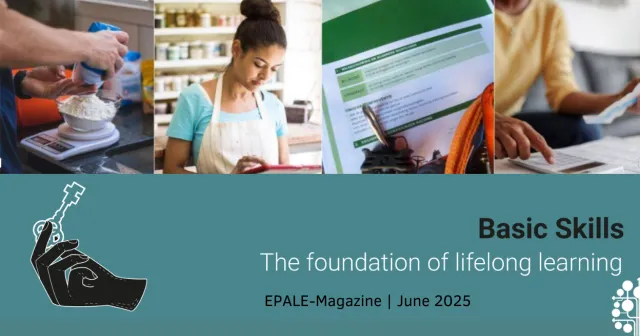Dear EPALE members,
Emmanuel Kant once stated that time is a necessary concept that underlies all our perceptions. In much the same way, time shapes how we experience learning: not just when or how long we study, but how education accompanies and guides us through different stages of life.
In this newsletter edition, we’re thinking about temporality — how time moves through learning — whilst fast-changing technologies like AI are simultaneously accelerating change in adult education. AI offers promising tools, from personalised pathways, to new forms of guidance and quicker feedback, while raising pressing questions about inclusion. Particularly OECD’s PIAAC recent data sounds the alarm on declining foundational skills and rising inequalities. How do we ensure that learners with limited digital or basic skills aren’t left behind in this transformation? And how can we create the conditions for everyone to move forward at their own pace, in their own time?
Speaking of time, a gentle reminder: your story matters. Whether you're just beginning or reflecting on years of experience, share your journey with the EPALE community before the 11 July deadline. Your contribution is part of the living memory of adult learning across Europe, and helps shape its future.

EPALE Resource Kit - Beyond the Buzz: AI in Adult Education

In a landscape where artificial intelligence is driving change in adult education and careers guidance, this comprehensive resource kit addresses the key issues facing practitioners today. Our contributors explore the balance between technological efficiency and empathy, examining whether AI can replicate coaching relationships and how hybrid approaches might complement rather than replace human judgement. With a focus on equity and the new AI law guidelines from the European Commission, this collection provides invaluable insights for navigating an ever-changing field.
► Download the resource kit now!
PIAAC demands action: basic skills to tackle inequalities

The latest OECD Survey of Adult Skills reveals a troubling trend: foundational literacy and numeracy skills are declining across Europe, and the resulting inequalities threaten social cohesion. This analysis examines Europe's policy response through initiatives such as the Union of Skills and the Action Plan on Basic Skills, and explores why evidence-based, community-centred approaches are vital for translating ambitious policies into tangible progress.
Is it all about time? The question(s) of temporality in adult learning

As we close this summer edition, we invite you to slow down and reflect on one of the most fundamental yet overlooked dimensions of adult learning: time itself. Discover how our relationship with time influences not just when we learn, but how we grow and transform throughout life, from the ability to mentally travel between past lessons and future goals to the quality of time we create in learning spaces.
The deadline for submitting your EPALE Community Story is approaching!

For a decade, educators like you have been using EPALE to share experiences, inspire change and build bridges between practice and policy across our continent. Your story could be the next chapter in this remarkable journey. The deadline for submissions is 11 July 2025, hurry up!
► Join the 10th celebration by contributing your voice to EPALE!



